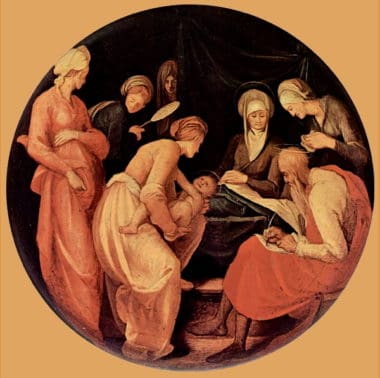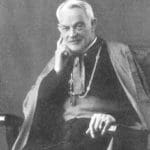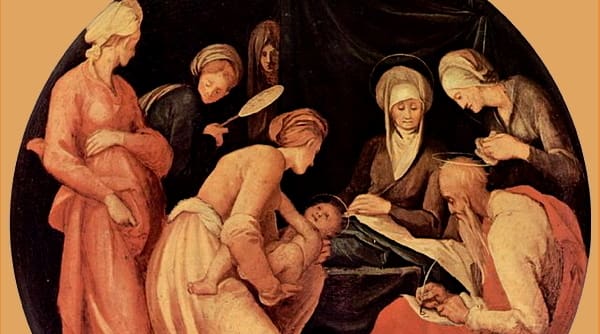THE BIRTH OF ST JOHN
“Now Elizabeth’s full time of being delivered was come, and she brought forth a son. And her neighbours and kinsfolks heard that the Lord had showed His great mercy towards her, and they congratulated with her. And it came to pass that on the eighth day they came to circumcize the child, and they called him by his father’s name, Zachary. And his mother, answering, said, Not so, but he shall be called John. And they said to her, There is none of thy kindred that is called by this name. And they made signs to his father how he would have him called. And demanding a writing-table, he wrote, saying: John is his name. And they wondered. And immediately his mouth was opened, and his tongue was loosed, and he spoke blessing God. And fear came upon all their neighbours, and all these things were noised abroad over all the hill country of Judea, and all they that had heard them laid them up in their heart, saying, What a one, think ye, shall this child be?
For the hand of the Lord was with him.”
Luke 1:57-66
1. This is one of those scenes in the Gospel which are full of mystery to us modern believers, because, as it were, it seems to put before us the direct interference of God with the things of this world. In the first age “God walked with Adam,” and brought him the animals that he might name them. In this age of Elizabeth and Zachary and Mary, He walked with them by means of His Angels, and still, in such special cases as these, insisted that the name to be given should not be meaningless. With us, so it seems to us, He permits things to take their course; our names have no meaning in themselves, they are only given to distinguish us. And so in other matters, He does not seem to interfere. Nonetheless is He faithful. If we have not signs such as these, we have signs that are greater–the miracle of the Church, the Blessed Sacrament, the constant wonder-working of grace.
 2. But with John, as with our Lord Himself, and as with no other in the New Testament that we know, God interfered that the significant name should be given. “John is his name” the “mercy” or the “ grace of God,” as the Angel had told to Zachary. One can look on with wonder, as did the neighbors, at this insistence on the name; but when we realize all that John the Baptist is to represent, one need not be surprised. John is the last of the long line of prophets sent to lift up the people in their depression and in their fall. He is to be the great source of grace for the generation in which he is to live. He is to be the preacher of still greater graces to come. He is to show the way to those graces: “Do penance, for the Kingdom of God is at hand.”
2. But with John, as with our Lord Himself, and as with no other in the New Testament that we know, God interfered that the significant name should be given. “John is his name” the “mercy” or the “ grace of God,” as the Angel had told to Zachary. One can look on with wonder, as did the neighbors, at this insistence on the name; but when we realize all that John the Baptist is to represent, one need not be surprised. John is the last of the long line of prophets sent to lift up the people in their depression and in their fall. He is to be the great source of grace for the generation in which he is to live. He is to be the preacher of still greater graces to come. He is to show the way to those graces: “Do penance, for the Kingdom of God is at hand.”
3. There is something triumphantly joyful about this birth of St John the Baptist. The joy of the mother, who had been blessed with the child in her old age; of the father, whose “tongue was loosed, and he spoke, blessing God”; of the gathered crowd, who “wondered” and “feared” with that joyful fear of which the Gospels often speak; of the child himself, who had “leapt in the womb” at the coming of our Lord; all this is at first in marked contrast with that mortified, austere, denouncing figure which we generally associate with the name of the Baptist. But those who understand know that the two are not antagonistic; that austerity and joy go hand in hand; and the Italian artists who are so fond of painting the child John playing happily with the Child Jesus at Mary’s knee, obey a true spiritual instinct.
Summary Meditation Points:
1. The wonderful hand of God, at times manifest, at other times hidden, but always there.
2. The significance of the name of John.
3. John the union of great joy and austerity.
 Editor’s Note: This meditation is from Archbishop Alban Goodier’s “The Prince of Peace” (1913).
Editor’s Note: This meditation is from Archbishop Alban Goodier’s “The Prince of Peace” (1913).
Art: Birth of John the Baptist, Jacobo Pontormo, 1526, PD, Wikimedia Commons. Mirror of Archbishop Alban Goodier, S.J., www.stmaryscadoganstreet.co.uk, all rights reserved, used with permission.




